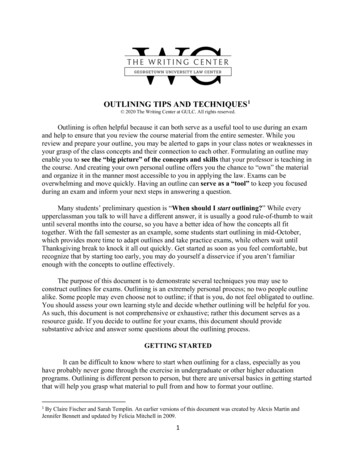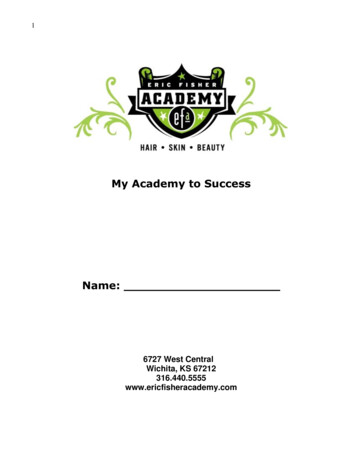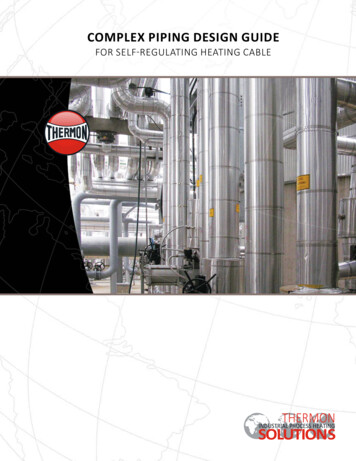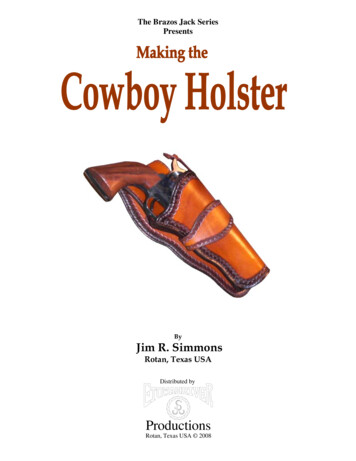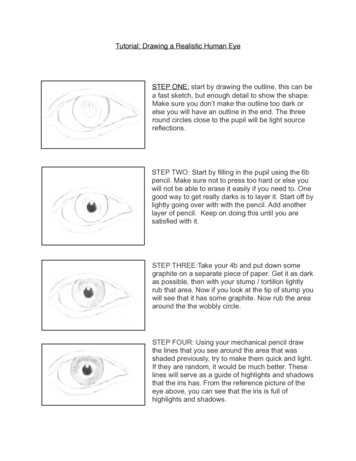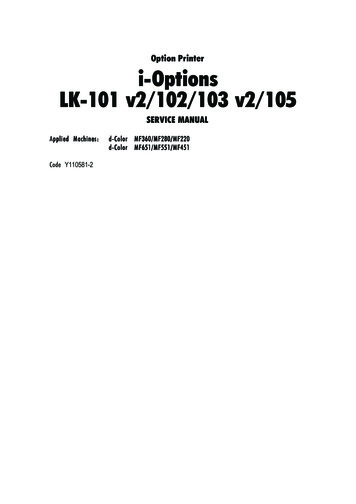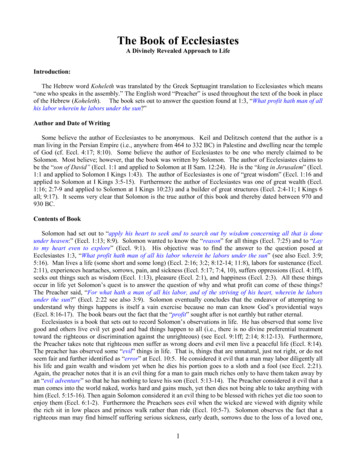
Transcription
The Book of EcclesiastesA Divinely Revealed Approach to LifeIntroduction:The Hebrew word Koheleth was translated by the Greek Septuagint translation to Ecclesiastes which means“one who speaks in the assembly.” The English word “Preacher” is used throughout the text of the book in placeof the Hebrew (Koheleth). The book sets out to answer the question found at 1:3, “What profit hath man of allhis labor wherein he labors under the sun?”Author and Date of WritingSome believe the author of Ecclesiastes to be anonymous. Keil and Delitzsch contend that the author is aman living in the Persian Empire (i.e., anywhere from 464 to 332 BC) in Palestine and dwelling near the templeof God (cf. Eccl. 4:17; 8:10). Some believe the author of Ecclesiastes to be one who merely claimed to beSolomon. Most believe; however, that the book was written by Solomon. The author of Ecclesiastes claims tobe the “son of David” (Eccl. 1:1 and applied to Solomon at II Sam. 12:24). He is the “king in Jerusalem” (Eccl.1:1 and applied to Solomon I Kings 1:43). The author of Ecclesiastes is one of “great wisdom” (Eccl. 1:16 andapplied to Solomon at I Kings 3:5-15). Furthermore the author of Ecclesiastes was one of great wealth (Eccl.1:16; 2:7-9 and applied to Solomon at I Kings 10:23) and a builder of great structures (Eccl. 2:4-11; I Kings 6all; 9:17). It seems very clear that Solomon is the true author of this book and thereby dated between 970 and930 BC.Contents of BookSolomon had set out to “apply his heart to seek and to search out by wisdom concerning all that is doneunder heaven:” (Eccl. 1:13; 8:9). Solomon wanted to know the “reason” for all things (Eccl. 7:25) and to “Layto my heart even to explore” (Eccl. 9:1). His objective was to find the answer to the question posed atEcclesiastes 1:3, “What profit hath man of all his labor wherein he labors under the sun” (see also Eccl. 3:9;5:16). Man lives a life (some short and some long) (Eccl. 2:16; 3:2; 8:12-14; 11:8), labors for sustenance (Eccl.2:11), experiences heartaches, sorrows, pain, and sickness (Eccl. 5:17; 7:4, 10), suffers oppressions (Eccl. 4:1ff),seeks out things such as wisdom (Eccl. 1:13), pleasure (Eccl. 2:1), and happiness (Eccl. 2:3). All these thingsoccur in life yet Solomon’s quest is to answer the question of why and what profit can come of these things?The Preacher said, “For what hath a man of all his labor, and of the striving of his heart, wherein he laborsunder the sun?” (Eccl. 2:22 see also 3:9). Solomon eventually concludes that the endeavor of attempting tounderstand why things happens is itself a vain exercise because no man can know God’s providential ways(Eccl. 8:16-17). The book bears out the fact that the “profit” sought after is not earthly but rather eternal.Ecclesiastes is a book that sets out to record Solomon’s observations in life. He has observed that some livegood and others live evil yet good and bad things happen to all (i.e., there is no divine preferential treatmenttoward the righteous or discrimination against the unrighteous) (see Eccl. 9:1ff; 2:14; 8:12-13). Furthermore,the Preacher takes note that righteous men suffer as wrong doers and evil men live a peaceful life (Eccl. 8:14).The preacher has observed some “evil” things in life. That is, things that are unnatural, just not right, or do notseem fair and further identified as “error” at Eccl. 10:5. He considered it evil that a man may labor diligently allhis life and gain wealth and wisdom yet when he dies his portion goes to a sloth and a fool (see Eccl. 2:21).Again, the preacher notes that it is an evil thing for a man to gain much riches only to have them taken away byan “evil adventure” so that he has nothing to leave his son (Eccl. 5:13-14). The Preacher considered it evil that aman comes into the world naked, works hard and gains much, yet then dies not being able to take anything withhim (Eccl. 5:15-16). Then again Solomon considered it an evil thing to be blessed with riches yet die too soon toenjoy them (Eccl. 6:1-2). Furthermore the Preachers sees evil when the wicked are viewed with dignity whilethe rich sit in low places and princes walk rather than ride (Eccl. 10:5-7). Solomon observes the fact that arighteous man may find himself suffering serious sickness, early death, sorrows due to the loss of a loved one,1
an unfortunate event that causes him to loose his life’s savings and all simply because he is a man upon theearth. Such a one does not suffer because of evil or good but rather all events happen to all walks of life (Eccl.9:23). The point is that anything can happen to anyone at any given moment (Eccl. 9:2). The Preacher wants toknow why that is.These thoughts cause a man to contemplate the same question that Solomon poses. What profit is there in allof these events under the sun (Eccl. 1:3; 2:22; 3:9)? Ecclesiastes leaves its readers with a real picture of life.The rich suffer as do the poor. The righteous man experiences calamity just as the wicked. Solomon reveals tous that through all our experiences on earth God’s providential hand is there (see Eccl. 9:1). The Lord is playingan active role in all of humanity’s life (Eccl. 6:1-2). He has no preference, prejudice, or discrimination when itcomes to allowing calamity and prosperity in a man’s life (Eccl. 9:2, 11). Solomon reveals that there is no wayfor man to know what the hand of God will do next in one’s life (Eccl. 7:14; 8:16-17; 11:5). Man cannot predict(Eccl. 7:10) nor change (Eccl. 7:13) God’s providence. Solomon’s advice for man is to thereby work hard uponthis earth, even though a calamity may befall us, (Eccl. 11:6).Though “all is vanity” and man cannot calculate or predict God’s providence we can nonetheless understandthat there is a purpose to all events in this life. Man is being proved while walking through this life (Eccl. 3:18;8:14; I Pet. 1:6-7; James 1:2-3). Let all humanity know that as we experience calamity, adversity, wealth,happiness, love, and all that life throws at us God is watching our reactions and knows the very thoughts of ourmind (see Deut. 31:21b; 32:18-19; Jer. 23:24-25). The wicked and foolish will experience great sorrows as areaction to calamity because their hope is in this world (II Cor. 7:10). The Christian ought to say as Job, “!akedcame I out of my mother’s womb, and naked shall I return thither: Jehovah gave, and Jehovah hath taken away;blessed be the name of Jehovah” (Job 1:21 see also II Cor. 4:16-18; Heb. 10:32-39). A secondary purpose foundin the vain things of life is joy. Though all is vanity not all is without purpose (see Eccl. 3:1). God intends manto enjoy the blessings of this life while we are among the living (Eccl. 2:24; 3:12-13; 5:18-20; 8:15; 9:7-9).ConclusionEcclesiastes gives us a panoramic view of life itself. We are born into this world and experience pleasures,heartaches, love, hatred, desires, wealth, and calamity. The entirety of life does not last long at all (James 4:14).When the end comes one may truly say that “all is vanity” (Eccl. 1:2; 2:17; 4:4; 9:9; 11:8; 12:8). The wordvanity means to be worthless. Why would Solomon conclude that all things done under the sun are “vanity?”The book of Ecclesiastes positively infers that the profit the Preacher searches for and contemplates is eternalvalue. To attempt to gain some eternal value from any of the earthly things mentioned in this book is truly tograsp after the wind (Eccl. 1:14). He thereby concludes that the whole duty of man, while living this short andvain life, is to “fear God and keep his commandments” (Eccl. 12:13; see Deut. 5:29; 6:2; Rev. 14:6-7 ascompared to Jn. 15:5-10). All of life is likened unto a race wherein man is proved by fiery trials (see I Cor.9:24ff). Those with a “perfect” approach to life will patiently endure the calamity of life and grow stronger dayby day (see Phil. 3:13-15; James 1:2-4). While God authorizes that there is “no better thing under the sun thanmirth” (Eccl. 8:15) He also warns man to be mindful of judgment and eternity (Eccl. 3:16-17; 11:9; 12:14; Rev.20:13). The message of Ecclesiastes is that there is no eternal profit in the things done under the sun; however,man should enjoy this life while being mindful of God’s laws, eternity, and judgment. What will God see in youand where will you spend your eternal existence?2
Themes in Ecclesiastes A search for profit (i.e., satisfaction and fulfillment in this life) (Eccl. 1:3; 2:22; 3:9)Solomon concludes that “all is vanity” in relation to eternal value (Eccl. 1:2; 2:17; 4:4; 9:9; 11:8 and 12:8)yet not without immediate purpose (Eccl. 3:1).God’s gift to man is to enjoy the fruits of his labor (Eccl. 2:24; 3:12-13, 22; 5:19; 8:15; 9:7-9; 11:8-9).Things the preacher observed: The Preacher saw that all works man does on earth has no lasting satisfaction(Eccl. 1:14). The preacher had observed that all labors of life are “weary” (Eccl. 1:8) and “a sore travail”(Eccl. 1:13; 3:10). He has observed that things crooked cannot be made straight (Eccl. 1:15). He saw thatwisdom excels folly (Eccl. 2:13). The preacher observed that, “In the place of justice, that wickedness wasthere.” (Eccl. 3:16-17). The preacher “saw” that that there is nothing better than that a man enjoy the fruitof his labors (Eccl. 3:22). The preacher “saw” the tears of them that are oppressed by the powerful (Eccl.4:1). Solomon concludes that such a quest in life (i.e., to gain wisdom in the since of knowing the “reason”of things is a vain exercise because there is so much that simply cannot be understood; i.e., God neverintended man to know / see Eccl. 8:16-17).Obtaining peace of mind: in relation to the vanity of weary and sore travail (just enjoy the fruit of labors /2:24; 3:12-13, 22). In relation to finding wickedness in places where justice and righteousness shouldprevail. God will judge the wicked (see Eccl. 3:16-17). The sinner who performs wicked acts “a hundredtimes and prolong his days” such a one will not escape the long arm of God’s justice (Eccl. 8:12).Death is the great equalizer with the wealthy and the educated (Eccl. 2:14-16), animals and man (see Eccl.3:19-20).Dreams (inability to sleep at night due to thinking about the days events) is vanity (i.e., will not bring oneany lasting profit [1:3] and is thereby vanity (Eccl. 2:22-23; 5:7, 12). Riches and more business are vanity(Eccl. 5:10-11)True profit comes of fearing God (see Eccl. 3:14; 5:7; 7:18; 8:12; 12:13-14)Things that are vain: Everything (Eccl. 1:2; 12:8), mirth (Eccl. 2:1), labor (Eccl. 2:11), materialism (Eccl.5:10), the righteous who suffer as though he did wrong and the wicked experience prosperity (Eccl. 8:14),youth (Eccl. 11:10), etc.Providence of God: God has an active part in man’s life (Eccl. 6:1-2). God does not discriminate whenworking in man’s life (i.e., calamity comes to all) (see Eccl. 9:2, 11). These providential works of Godcannot be predicted, known, or calculated (Eccl. 7:14; 8:16-17; 11:5). God’s providence cannot be changedby man (Eccl. 7:13) except it be by prayer and His will (Rom. 8:26-28).The identity of the fool: he is a sinner (Eccl. 5:1), lacks understanding (Eccl. 2:14; 10:3), slothful in workhabits (Eccl. 2:21; 4:5; 10:15), known by the multitude of words (Eccl. 5:3; 10:12-14), possesses littleintegrity (Eccl. 5:4-5), lacks self control (Eccl. 6:8), does not consider the seriousness of life (everything is ajoke / Eccl. 7:4-6), seeks profit from this world (Eccl. 7:5), a lover of money rather than reason (Eccl. 7:7),known by their outburst of anger (Eccl. 7:9).The identity of the wise: The wise are bothered by sin (Eccl. 7:4, 19-20), rebuke the erring (Eccl. 7:5),patient in adversity (Eccl. 7:8, 14), not soon angry (Eccl. 7:9), understands and interprets truth (Eccl. 8:1),walks in paths of righteousness (Eccl. 10:2-3).3
Outline of EcclesiastesI.Are the endless cycles of labor, life, death, and nature all there is to our Existence? (1:1-11)A. “The words of the Preacher, the son of David, king in Jerusalem. Vanity of vanities, saith thePreacher; vanity of vanities, all is vanity” (1:1-2).1. The evidences examined in the introduction clearly point to Solomon being the author ofEcclesiastes (i.e., “the Preacher, the son of David, king in Jerusalem”).2. Solomon’s wealth, world honor, and access to all things of the earth caused him to conclude that“all is vanity.” The word “vanity” “lack of usefulness, worth, or effect; worthlessness orfutile” (AHD 1337).3. The book of Ecclesiastes will bear out the fact that all things pertaining to this life are worthlessand futile as far as eternity is concerned.B. “What profit hath man of all his labor wherein he labors under the sun?” (1:3).1. The preacher raises the question that this book seeks to answer. What “profit” (benefit, gain, orreturns) is there to be found of life’s labors?2. One may say that there is much profit. One receives retirement, ease in old age, groceries,stability of life, pleasures in recreation and so forth. Yet as we answer such a question withthese words we slowly realize that the preacher has under consideration something far morethan simple life in this world.C. “One generation goes, and another generation comes; but the earth abides for ever. The sun alsoarises, and the sun goes down, and haste to its place where it arises. The wind goes toward thesouth, and turns about unto the north; it turns about continually in its course, and the wind returnsagain to its circuits. All the rivers run into the sea, yet the sea is not full; unto the place whither therivers go, thither they go again” (1:4-7).1. If one seeks to find usefulness, worth, benefit, gains, or some sort of return from a life thatcomes and then is gone where is it. Generation after generation there are people born, they live,and then die. When one dies the wind continues to blow in its circuits and rivers continue to runto the sea.2. What return is there for a man or woman under such an endless cycle of life? When I die thingswill continue as they have always been. My particular life and death is meaningless in therealm of the ongoing cycles of life on earth. When I die things will go on in this earth. I hadmy time and my time ended. So where is the return for me? Is this life all that there is to ourexistence?3. The agnostic (someone who believes that there can be no proof of the existence of God but doesnot deny the possibility that God exists) may be satisfied with birth, life, and death yet thePreacher is questioning whether this life is all there is. What return is there for me in all mylabors under the sun?4. To this point it seems that the underlying question of eternal existence is considered. Is theresomething that exists beyond this world that will convey a return for what I have done on thisearth?D. “All things are full of weariness; man cannot utter it: the eye is not satisfied with seeing, nor the earfilled with hearing” (1:8).1. Once again the Preacher uses the term “all things” (see also verse 2 where he said “all isvanity”).2. What ever is vanity (worthless and without return) at verse three is the “all things” of verse 8.To this point the Preacher has identified labor as that which is depicted as vain (see study # 1;Things that are Vain).3. Man participates in labor, life, death, and the observance of the natural elements of the earth welive in. The participation in these things is “weariness” in that they appear to perpetually moveforward without stoppage. They are not hindered by my participation. They existed withoutme, with me, and they will continue to exists as the earth remains. The human mind andlanguage can scarcely put into words a description of such endless process. We see and hear4
II.these events our whole life yet nothing really changes or is new. The process marches forwardas it always has.E. “That which hath been is that which shall be; and that which hath been done is that which shall bedone: and there is no new thing under the sun” (1:9).1. The preacher examines events (labor, life, death, and natural occurrences of the earth) of timespast that shall recycle again under a different generation. People today will toil in labor,experience life (i.e., joy, riches, passions, desires, goals, etc.), they will die, and all the while theearth continues to do the things of nature (i.e., the sun continues to rise, plants grow and die,water flows through rivers, erosion occurs, etc.).2. The Preacher concludes thereby that in all reality “there is no new thing under the sun.” Theonly “new” that exists in the world of labor, life, death, and nature is found within the individualwho now finds self participating in life. Though it is new to him it is not new to the existence oftime.F. “Is there a thing whereof it may be said, See, this is new? It hath been long ago, in the ages whichwere before us. There is no remembrance of the latter generations that are to come, among thosethat shall come after” (1:10-11).1. One may say that Aids is a new disease that has not always been around. Another may say thatthe game of baseball is new in that past generations did not know the game. Such thought ismissing the point of the Preacher however.2. The Preacher is looking to the answer to his question. “What profit hath man of all his laborwherein he labors under the sun?” (1:3). The “all things” of the chapter are efforts of labor.The “all things” are labor and may include the days of our life, death, and natural occurrencesof the earth. The ages before us were filled with the exact same toil of labor, life, death, andnatural occurrences. People have always lived and done these things in the human experience.If we pull one person out of this endless cycle can we find any profit that extends past theendless cycles of labor, life, death, and nature for that person’s toil?The Preacher seeks out wisdom concerning labor, life, death, and nature (1:12-18):A. “I the Preacher was king over Israel in Jerusalem. And I applied my heart to seek and to search outby wisdom concerning all that is done under heaven: it is a sore travail that God hath given to thesons of men to be exercised therewith” (1:12-13).1. The author of Ecclesiastes has been identified as the “Preacher,” “son of David” (1:1), and nowthe “king over Israel.” These facts add up to Solomon.2. The Preacher wanted answers to “all that is done under heaven.” The “weariness” that man hasno words for of Eccl. 1:8 is that which is a “sore travail that God hath given to man.” Researchis generally wearisome and rigorous in the exertion of energy.3. The Preacher acknowledges that “God hath given” man the task of finding answer to life’squestions through rigorous investigation (see I Pet. 3:21).B. “I have seen all the works that are done under the sun; and, behold, all is vanity and a striving afterwind” (1:14).1. All there is to labor, life, death, and nature have been observed through rigorous research by thePreacher and he has concluded that wisdom in these things is “vanity and a striving after wind.”To gain an understanding heart of wisdom in the issues of life is a worthless and futile exerciseof striving after the wind.2. Again, one may asks when one understands all things of this life what real (eternal) benefit orreturn can I expect from this? The Preacher wants to know “what profit (benefit, return, gain)hath man of all his labor wherein he labors under the sun?” (Eccl. 1:3).C. “That which is crooked cannot be made straight; and that which is wanting cannot be numbered”(1:15).1. As one gains an understanding of the events “under the sun,” such as labor, the conclusion isthat those things that are shall always be. There will always be those who deal dishonestly andthose who deal honestly. There will always be those who work hard and those who are lazysloths. There will always be those who save and those who spend. Then again, we must realize5
that God’s providence will always be. Suffering, laughter occur to all without our control of thetiming thereof.2. The point is that my understanding of these things will change nothing because these things willalways be. Things that are crooked and lacking in man’s life will always be. An example ofthis would be that there will always be poor people who need help. If I gave every dime I hadto change this it would not settle the ever present state of poverty.D. “I communed with mine own heart, saying, Lo, I have gotten me great wisdom above all that werebefore me in Jerusalem; yea, my heart hath had great experience of wisdom and knowledge. And Iapplied my heart to know wisdom, and to know madness and folly: I perceived that this also was astriving after wind” (1:16-17).1. The preacher, after much toil of gaining wisdom regarding the things done under the sun,looked within his own mind and concluded that he had obtained his objective of understanding.He had properly distinguished wisdom from its true opposite (i.e., madness and folly). Wisdomunderstands and madness and folly are equated with ignorance and carelessness.2. The conclusion to said observations is that the ability to distinguish wisdom from folly has noreal and lasting returns (i.e., profit [1:3]). The preacher realizes that such an endeavor has lefthim feeling unsatisfied and still hungry for something that is missing in his life.E. “For in much wisdom is much grief; and he that increases knowledge increases sorrow” (1:18).1. How is it that “in much wisdom is much grief and sorrow?”2. To have insight and knowledge of all the things crooked that cannot be made straight is to knowall the inevitable pain, suffering, hardships, and success that comes with life itself. Some willlive their lives in ease while others experience extreme heartaches and hardships. Some menare very evil and some are very good. The grief associated with wisdom is found when onerealizes that nothing can be done to change these tendencies of life. There will always beheartache and joy among those who labor under the sun. To have knowledge of these facts canbe somewhat disheartening when peering into the real lives of people. This peering is not amere casual observation but a real understanding of the hardships some are going through. It isheart wrenching to know that so many people live, make foolish decisions, spend their lives inprison while their children go fatherless and we could look to a multitude of other examples ofsuch things.Chapter 2I.The Preacher seeks out Pleasure as a labor that may possibly give him Satisfaction (2:1-3):A. “I said in my heart, Come now, I will prove thee with mirth; therefore enjoy pleasure: and, behold,this also was vanity” (2:1).1. God proves man’s heart with heartaches, suffering, and hardships (I Pet. 1:6-7) that He mightknow whether man will continue to keep His commandments and turn to Him for help (seeDeut. 8:2-3, 16). The preacher proved his own heart with “pleasure” to see whether this wouldbring him the “profit” (Eccl. 1:3 / i.e., returns or satisfaction in life) he so desperately desired.2. The preacher quickly concludes that pleasures did not bring him profit as far as lastingsatisfaction within his soul.B. “I said of laughter, It is mad; and of mirth, What doeth it?” (2:2).1. Laughter may be deduced as madness when one considers the understanding of the eventsunder the sun. So much suffering and hardships can lead no man to smile. Yet, there are thingsof this world that make us laugh. What satisfying quality does laughter have when the realityof things being crooked and unable to be straightened exists?2. The Preacher seems to turn his head away from wisdom to seek pleasure in something in thisworld. Once he finds it; however, it does not satisfy this inner craving of the soul. Truehappiness is not found in laughter and mirth (lightheartedness and gladness).6
II.III.C. “I searched in my heart how to cheer my flesh with wine, my heart yet guiding me with wisdom, andhow to lay hold on folly, till I might see what it was good for the sons of men that they should dounder heaven all the days of their life” (2:3).1. Still searching for true satisfaction and happiness of heart in this life the preacher turned fromseeking out wisdom to seeking out various pleasures. The preacher drank wine yet temperedthe state of drunkenness with wisdom (he did not allow himself to get so drunk as to loose sightof reality).2. He tried his hand at reckless abandonment of folly (living ignorant of the realities of life).Folly is to “lack good sense, understanding, foresight, an act or instance of foolishness. actionor behavior considered immoral or criminal. evil; wickedness” (AHD 520).3. The preacher’s quest for profit, satisfaction, fulfillment, and happiness in life continued toevade him in the endeavors of pleasure. Though pleasures can satisfy man’s immediate needsand desires it has no eternal value.The Preacher seeks out Building Great Structures to satisfy his craving for something profitable,satisfying, and fulfilling in his life (2:4-6):A. “I made me great works; I builded me houses; I planted me vineyards; I made me gardens andparks, and I planted trees in them of all kinds of fruit;” (2:4-5).1. Finding no lasting profit (satisfying and fulfilling) in wisdom and pleasures the preacher turnsto building.2. To view the finished work of one’s hands is indeed intriguing to the soul. To stand back andview one’s house, vineyard, garden, and landscaping is fulfilling yet is it really.B. “I made me pools of water, to water therefrom the forest where trees were reared;”1. The preacher tried his hand at forestry. He sought to grow trees for harvest and made pools ofwater to cause the trees to thrive rather than go thirsty.2. Though the preacher did all these things and could see with his eyes the fruit of his labor it didnot satisfy that insatiable hunger to be satisfied fully within. There continued to be somethingmissing in his inner being.The Preacher seeks out Riches to satisfy his craving for something profitable, satisfying, andfulfilling in his life (2:7-11):A. “I bought men-servants and maid-servants, and had servants born in my house; also I had greatpossessions of herds and flocks, above all that were before me in Jerusalem; I gathered me alsosilver and gold, and the treasure of the kings and of the provinces; I gat me men-singers andwomen-singers, and the delights of the sons of men, musical instruments, and that of all sorts”(2:7-8).1. Finding no real lasting profit of satisfaction in wisdom, folly, pleasure, and buildings thepreacher searches out satisfaction in the things of this world.2. The preacher bought all the luxuries of life that money can buy to find that illusive satisfactionof his inner being.B. “So I was great, and increased more than all that were before me in Jerusalem: also my wisdomremained with me. And whatsoever mine eyes desired I kept not from them; I withheld not my heartfrom any joy; for my heart rejoiced because of all my labor; and this was my portion from all mylabor” (2:9-10).1. The endeavor to accumulate riches and things of this world were not hindered. The preachergained all that a man can gain and there was nothing kept from his desires.2. The fruits of the preacher’s labors caused him to rejoice within his heart (i.e., he found pleasureand happiness in these luxuries). He concluded that he had labored and earned the things thathe had now accumulated. Would this satisfy the inner hunger of his search for profit andsatisfaction in life?C. “Then I looked on all the works that my hands had wrought, and on the labor that I had labored todo; and, behold, all was vanity and a striving after wind, and there was no profit under the sun”(2:11).1. The real “profit” (see Eccl. 1:3) (i.e., true satisfaction in the returns one’s endeavors produce)was not to be found in accumulating the goods of this world.7
IV.V.2. While the preacher admits to experiencing joy in these things it did not produce the innersatisfaction he was searching for. The emptiness and void within his mind continued to gnawat his inner being.The preacher reasons that Wisdom is superior to Folly yet even this conclusion does not bring himinner contentment (2:12-17):A. “And I turned myself to behold wisdom, and madness, and folly: for what can the man do thatcomes after the king? Even that which hath been done long ago. Then I saw that wisdom excelledfolly, as far as light excels darkness. The wise man’s eyes are in his head, and the fool walks indarkness: and yet I perceived that one event happened to them all” (2:12-14).1. The superiority of wisdom over folly is compared to the dominant trait of light over darkness.Light always defeats darkness.2. The preacher observes that the world is filled of both wise and foolish (this will always be).The preacher observes a similarity; however, between the wise and foolish. Hardships,heartaches, pain, and happiness is experienced by all. The wise, through their accumulation ofunderstanding, are not immune to the hardships and neither do they monopolize joys in life.3. The preacher sees that the brevity of life is the great equalizer to the wise and foolish alike.B. “Then said I in my heart, as it happens to the fool, so will it happen even to me; and why was I thenmore wise? Then said I in my heart, that this also is vanity. For of the wise man, even as of thefool, there is no remembrance for ever; seeing that in the days to come all will have been longforgotten. And how doth the wise man die even as the fool!” (2:15-16).1. Both wise and fool are subject to disease, sorrows, and death. What profit is it in death to havespent one’s life gaining wisdom when the wise are just as subject to life as the fool?2. The preacher concludes that he is really not any better off than the fool when it comes to theend of one’s days. He asks, “why was I then more wise?”C. “So I hated life, because the work that is wrought under the sun was grievous unto me; for all isvanity and a striving after the wind” (2:17)
The book bears out the fact that the “ profit ” sought after is not earthly but rather eternal. Ecclesiastes is a book that sets out to record Solomon’s observations in life. He has observed that some live good and others live evil yet good and bad things happen to





